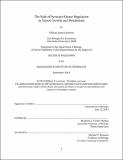The role of pyruvate kinase regulation in tumor growth and metabolism
Author(s)
Israelsen, William James
DownloadFull printable version (68.17Mb)
Other Contributors
Massachusetts Institute of Technology. Department of Biology.
Advisor
Matthew G. Vander Heiden.
Terms of use
Metadata
Show full item recordAbstract
Cancer is a disease of inappropriate cell proliferation, and central carbon metabolism is highly regulated to support the unique anabolic needs of proliferating cells. Pyruvate kinase, the enzyme catalyzing the final step of glycolysis, is an important point of regulation. Mammals have four pyruvate kinase isoforms, and one in particular, the M2 isoform, is preferentially expressed in proliferative tissues, including cancers. We sought to determine the role and importance of PKM2 in cancer. The activity of pyruvate kinase M2 (PKM2) is down-regulated by pro-proliferative signaling in the cell, and reduced PK activity appears to be important for proliferative metabolism. Because oncogenic signaling reduces PKM2 activity, we hypothesized that artificially high intracellular pyruvate kinase activity would disrupt proliferative metabolism and hinder tumor growth. We found that increased PK activity due to expression of the constitutively-active PKM1 isoform or direct pharmacological activation of PKM2 perturbs metabolism and reduces tumor growth in a lung cancer xenograft model. These results suggested that PKM2 expression is selected for in cancers because PKM2 activity can be down-regulated in a controlled fashion. We next sought to determine if the PKM2 isoform is necessary for tumor proliferation. Deletion of PKM2 in a mouse model of BRCA1-deficient breast cancer demonstrated that PKM2 is not required for tumor formation or growth. PKM2-null tumors exhibited heterogeneous PKM1 expression, and tumor cell proliferation was associated with low PKM1 expression in the absence of PKM2. Analysis of human breast tumors revealed highly variable PKM2 protein expression, and heterozygous PKM2 mutations were found in many cancer types. These mutations cause truncations or amino acid changes in conserved regions of the enzyme. Determination of kinetic parameters of purified wild-type and mutant PKM2 showed that cancer-associated missense mutations reduce affinity of the enzyme for substrate, reduce maximum velocity, or disrupt response of the enzyme to activation by its allosteric activator FBP. These results suggest that cancer cells tolerate or select for reduced pyruvate kinase activity. We conclude that PKM2 is important because its activity is down-regulated to support proliferation, but the PKM2 isoform itself is not required for tumor formation or cancer cell proliferation.
Description
Thesis: Ph. D., Massachusetts Institute of Technology, Department of Biology, 2014. This electronic version was submitted by the student author. The certified thesis is available in the Institute Archives and Special Collections. Cataloged from student-submitted PDF version of thesis. Vita. Includes bibliographical references.
Date issued
2014Department
Massachusetts Institute of Technology. Department of BiologyPublisher
Massachusetts Institute of Technology
Keywords
Biology.